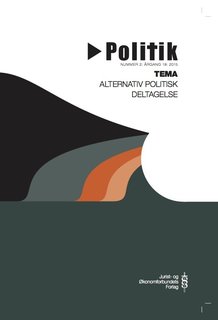After Governance: A Normative Re ection on Civil Society Participation in Policy Processes
DOI:
https://doi.org/10.7146/politik.v18i2.27611Resumé
This paper discusses the normative implications of a political vision that aims to integrate civil society into new governance mechanisms, pragmatic governance in particular, by virtue of the funding of civil society organisations. is vision has led to a marked increase in both funding for civil society and in the assignment of governance tasks to civil society organisations that are normally performed by the public sector. However, some of the crucial aspects of these normative, ontological perspectives are either counter-factual or limited by at least two major factors: 1) the prevailing technocratic style of policy making used in pragmatic govern- ance, and 2) the proliferation of managerialism, i.e. the idea that any kind of social organisation must be administered by managers and that the public and civil society sectors should use of corporate/business sector professional management techniques and tools. Both pragmatic governance and managerialism a ect, and re-de ne, the traditional conception of civil society as autonomous, authentic, voluntary organisations that act as a check and balance on the excessive use of power by the state.
Downloads
Publiceret
Citation/Eksport
Nummer
Sektion
Licens
Forfattere, der publicerer deres værker via dette tidsskrift, accepterer følgende vilkår:
- Forfattere bevarer deres ophavsret og giver tidsskriftet ret til første publicering, samtidigt med at værket er omfattet af en Creative Commons Attribution-licens, der giver andre ret til at dele værket med en anerkendelse af værkets forfatter og første publicering i nærværende tidsskrift.
- Forfattere kan indgå flere separate kontraktlige aftaler om ikke-eksklusiv distribution af tidsskriftets publicerede version af værket (f.eks. sende det til et institutionslager eller udgive det i en bog), med en anerkendelse af værkets første publicering i nærværende tidsskrift.
- Forfattere har ret til og opfordres til at publicere deres værker online (f.eks. i institutionslagre eller på deres websted) forud for og under manuskriptprocessen, da dette kan føre til produktive udvekslinger, samt tidligere og større citater fra publicerede værker (se The Effect of Open Access).

